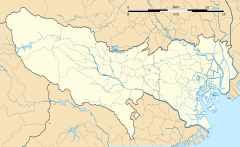Fudō-mae Station
Appearance
MG02 Fudō-mae Station 不動前駅 | |||||||||||
|---|---|---|---|---|---|---|---|---|---|---|---|
 The station entrance in March 2019 | |||||||||||
| General information | |||||||||||
| Location | Shinagawa, Tokyo Japan | ||||||||||
| Operated by | |||||||||||
| Line(s) | |||||||||||
| Platforms | 2 side platforms | ||||||||||
| Tracks | 2 | ||||||||||
| Construction | |||||||||||
| Structure type | Elevated | ||||||||||
| Other information | |||||||||||
| Station code | MG02 | ||||||||||
| History | |||||||||||
| Opened | 11 March 1923 | ||||||||||
| Previous names | Megurofudōmae (until 1923) | ||||||||||
| Passengers | |||||||||||
| FY2018[1] | 31,317 daily | ||||||||||
| Services | |||||||||||
| |||||||||||
| |||||||||||
Fudō-mae Station (不動前駅, Fudō-mae-eki) is a railway station on the Tokyu Meguro Line in Shinagawa, Tokyo, Japan, operated by the private railway operator Tokyu Corporation.

Lines
[edit]Fudō-mae Station is served by the Tokyu Meguro Line. Only "Local" all-stations trains stop at this station.
Station layout
[edit]This station consists of two opposed side platforms serving two tracks. Only local trains stop at this station.
| 1 | ■ Tokyu Meguro Line | for Den-en-chōfu, Hiyoshi, Shin-Yokohama and Futamatagawa |
| 2 | ■ Tokyu Meguro Line | for Meguro, Nishi-takashimadaira, and Akabane-iwabuchi |
History
[edit]The station opened on March 11, 1923 as Megurofudōmae Station (目黒不動前駅) when the Meguro Kamata Railway started its operation between Meguro Station and Maruko Station (present-day Numabe Station). The station was renamed Fudō-mae in October 1923.[2]
Ridership
[edit]| Year | Ridership |
|---|---|
| 2010 | 27,426[3] |
| 2011 | 27,871[4] |
| 2012 | 28,519[5] |
| 2013 | 28,918[6] |
| 2014 | 28,909[7] |
| 2015 | 29,492[8] |
| 2016 | 29,964[9] |
| 2017 | 30,805[10] |
| 2018 | 31,317[1] |
See also
[edit]References
[edit]- ^ a b "TOKYU CORPORATION 2019-2020". Retrieved 18 Mar 2020.[permanent dead link]
- ^ Information on Lines Archived 2008-10-14 at the Wayback Machine (Tokyu Corporation) (in Japanese)
- ^ "TOKYU CORPORATION 2011-2012". www.tokyu.co.jp. Retrieved 2020-03-18.
- ^ "TOKYU CORPORATION 2012-2013". www.tokyu.co.jp. Retrieved 2020-03-18.
- ^ "TOKYU CORPORATION 2013-2014". www.tokyu.co.jp. Retrieved 2020-03-18.
- ^ "TOKYU CORPORATION 2014-2015". www.tokyu.co.jp. Retrieved 2020-03-18.
- ^ "TOKYU CORPORATION 2015-2016". www.tokyu.co.jp. Retrieved 2020-03-18.
- ^ "TOKYU CORPORATION 2016-2017". www.tokyu.co.jp. Retrieved 2020-03-18.
- ^ "TOKYU CORPORATION 2017-2018". www.tokyu.co.jp. Retrieved 2020-03-18.
- ^ "TOKYU CORPORATION 2018-2019". www.tokyu.co.jp. Retrieved 2020-03-18.
External links
[edit]Wikimedia Commons has media related to Fudō-mae Station.
- Fudō-mae Station information Archived 2008-10-01 at the Wayback Machine (Tokyu Corporation) (in Japanese)




